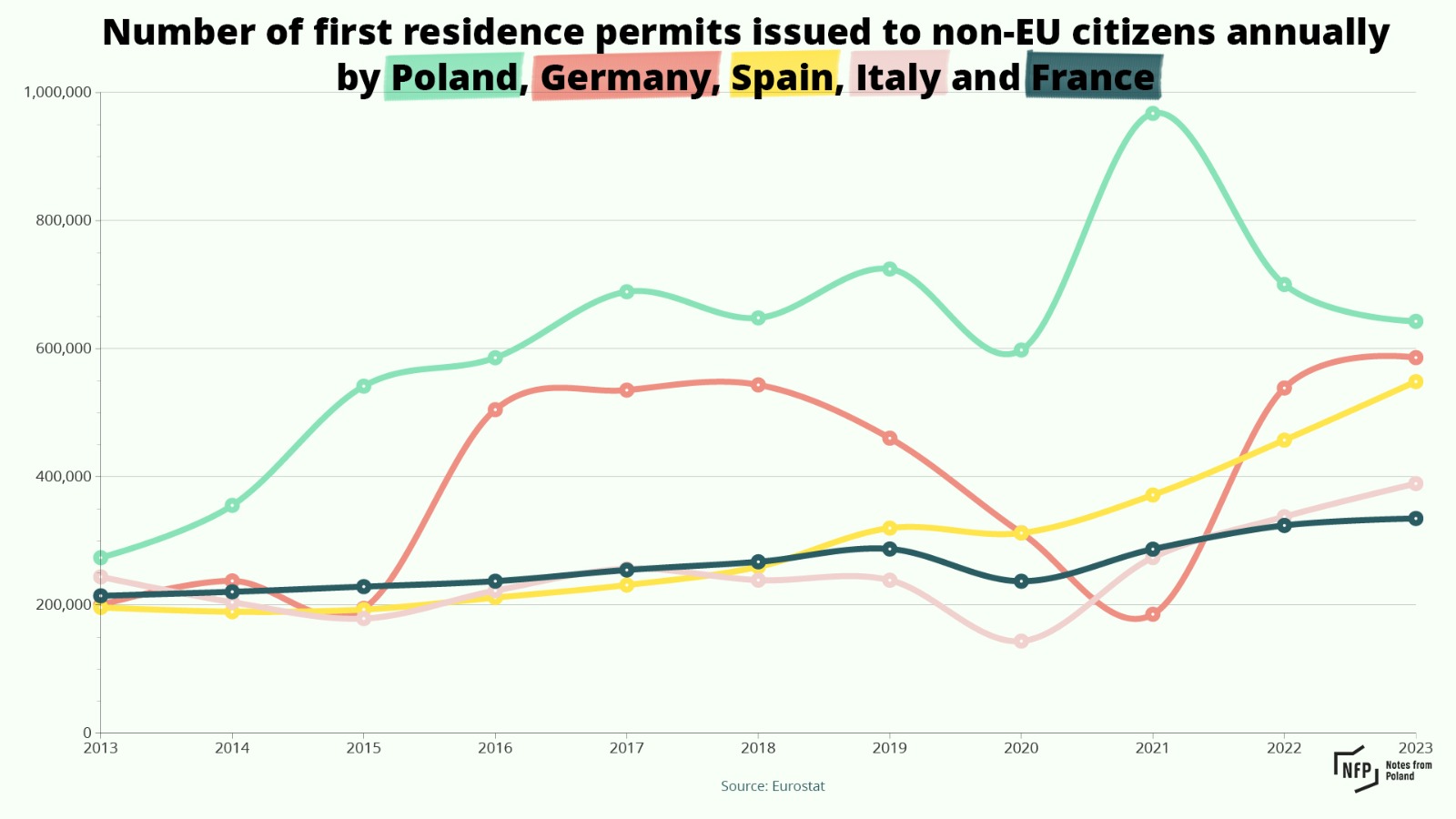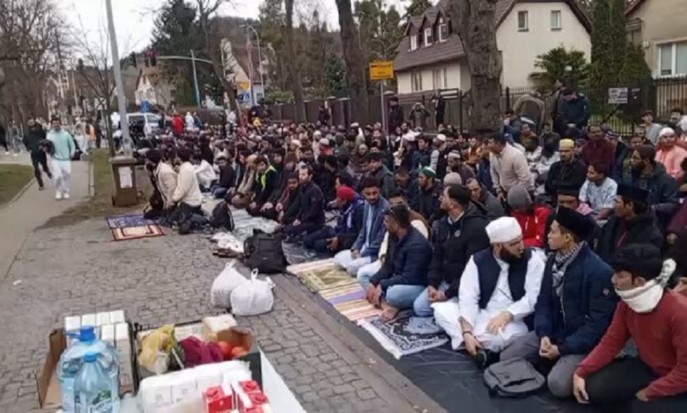Keep our news free from ads and paywalls by making a donation to support our work!

Notes from Poland is run by a small editorial team and is published by an independent, non-profit foundation that is funded through donations from our readers. We cannot do what we do without your support.
Images of large numbers of Muslims praying in Polish cities have stirred controversy, with right-wing opposition politicians raising concern about the impact of mass immigration. However, local media report that such celebrations of Islamic festivals have also happened in previous years.
On Sunday, Muslims around the world began celebrating Eid al-Fitr, a three-day festival marking the end of the month-long period of Ramadan, during which Muslims are expected to fast from dawn to dusk.
Trzeba natychmiast zamknąć granicę dla imigrantów z państw muzułmańskich! Zanim będzie za późno, zanim w Polsce będzie jak w Wielkiej Brytanii, Francji czy Szwecji.
To jest ostatnia szansa. Trzeba rozpocząć deportacje, zamiast próbować ich integrować!pic.twitter.com/uuDg4ipSc1
— Sławomir Mentzen (@SlawomirMentzen) March 30, 2025
In Poland, pictures and videos showing large number of Muslims celebrating the festival went viral on social media.
In Gdańsk, for example, people could be seen sitting outside a mosque on the city’s Abraham Street, which had been closed off by police.
Other videos purported to show Muslims who had gathered on a street in Wrocław, Poland’s third-largest city, and in a sports hall in Mysłowice, a town of around 70,000 in southern Poland.
Nie tylko Gdańsk czy Wrocław. Oto scenka rodzajowa z Mysłowic.
I co uśmiechacie się? pic.twitter.com/P692BJ4xkB— Rafał 🇵🇱 (@_rafaello81) March 31, 2025
Poland in fact has one of Europe’s oldest Muslim communities, the Lipka Tatars, who have lived in a small area in the northeast of the country since the 14th century.
However, the vast majority of Muslims have arrived in recent years, during which time Poland has experienced the highest levels of immigration in its history and among the highest in Europe.
Between 2019 and 2023, the number of work permits granted annually by Poland to immigrants from Asia rose fivefold, from around 50,000 to 250,000. That included tens of thousands of people from Muslim-majority countries such as Bangladesh, Turkey, Uzbekistan and Indonesia.
The Muslim Religious Union in the Republic of Poland estimates that the current number of Muslims in Poland is around 60,000.

Videos of the Eid al-Fitr celebrations in Poland were shared on social media in particular by figures associated with Poland’s two main opposition parties, the national-conservative Law and Justice (PiS) and the far-right Confederation (Konfederacja).
Sławomir Mentzen, one of Confederation’s leaders and its candidate for May’s presidential election, posted a video from the Gdańsk mosque and wrote: “We need to close the border to immigrants from Muslim countries immediately! Before it’s too late, before Poland becomes like Great Britain, France or Sweden.”
“This is the last chance,” he added. “We need to start deporting them instead of trying to integrate them!”
Gdańsk. Dziś. Islamizacja Polski.
Tusk — żądamy natychmiast:
1.Wypowiedzenia Paktu Migracyjnego,
2.Zamknięcia granic,
3.Zaniechania tworzenia Centrów Integracji Cudzoziemców oraz wszelkiej infrastruktury wspierającej inwazję imigrantów na Polskę.Działaj ze mną — broń Polski… pic.twitter.com/gxv7payUaH
— Robert Bąkiewicz (@RBakiewicz) March 30, 2025
Meanwhile, Daniel Obajtek, a PiS MEP, blamed the government of Prime Minister Donald Tusk for the situation.
“Tusk’s tourists on the offensive,” he wrote alongside a video from the Gdańsk mosque. “Can you imagine such an image during the times when PiS was in power.”
Mass immigration in fact took place when PiS was in power from 2015 to 2023. During that time, Poland for seven years running issued more first residence permits to immigrants from outside the European Union than any other member state.
While the vast majority of those who arrived came from Ukraine and Belarus, there were also growing numbers from Asia and Africa.
Poland issued 275,000 work permits to migrants from Asia and Latin America last year, five times more than in 2019.
The figures have accelerated particularly fast since 2022, when most Ukrainian men were banned from moving abroad due to the war https://t.co/KldHUG0Ws8
— Notes from Poland 🇵🇱 (@notesfrompoland) May 20, 2024
Trojmiasto.pl, a news service covering Gdańsk and the neighbouring cities of Gdynia and Sopot, notes that Abraham Street, where a mosque has been located since the 1980s, is closed to car traffic every year during Eid al-Fitr.
It added that last Sunday’s “celebrations took place without disturbing the peace and public order in the district…[where] local residents have long become accustomed to Muslims, who pray in front of the mosque during the most important Islamic holidays”.
Rafał Mrowicki, a journalist based in Gdańsk, wrote in a post on X that Muslims were simply celebrating an important festival “without harming anyone” and noted that members of Poland’s Catholic majority also conduct religious events, such as processions, in the streets.
Właśnie skończył się ramadan, a ten meczet jest głównym punktem praktyk religijnych muzułmanów z Gdańska i okolic. Modlitwą nikomu nie robią krzywdy. Są częścią społeczności. W najbliższych tygodniach katolicy wyjdą na uliczne drogi krzyżowe i procesje świąteczne. https://t.co/Ba5lxCkviy
— Rafał Mrowicki (@MrowickiRafal) March 30, 2025
When Tusk’s ruling coalition came to power in 2023, it did so after an election campaign in which it accused the PiS government of allowing uncontrolled immigration, including through corruption in the visa system.
Tusk has since announced new policies to clamp down on visa irregularities as well as further measures intended to prevent irregular crossings by migrants and asylum seekers over the border from Belarus. That includes a newly introduced ban on filing asylum claims at that border.
Tusk recently announced that Poland would stop complying with EU rules requiring it to take back asylum seekers from Germany. He has also declared that Poland will not comply with elements of the migration pact that require the relocation of asylum seekers.
However, PiS argues that Tusk – a former president of the European Council – is making such declarations for political reasons ahead of May’s presidential election and that in practice he will not follow through.
Poland has suspended the right to claim asylum on the border with Belarus, making immediate use of a law signed by the president yesterday.
This will "combat illegal migration, which is an element of hybrid aggression against Poland", says the government https://t.co/OEWd6aWzDC
— Notes from Poland 🇵🇱 (@notesfrompoland) March 27, 2025

Notes from Poland is run by a small editorial team and published by an independent, non-profit foundation that is funded through donations from our readers. We cannot do what we do without your support.

Daniel Tilles is editor-in-chief of Notes from Poland. He has written on Polish affairs for a wide range of publications, including Foreign Policy, POLITICO Europe, EUobserver and Dziennik Gazeta Prawna.



















